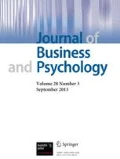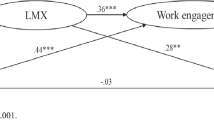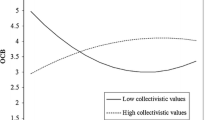Abstract
The present study extends research related to the dark triad (DT) personality traits, Machiavellianism, narcissism, and psychopathy, by demonstrating a managerial action that mitigates negative behaviors traditionally associated with the DT. Drawing from self-determination theory, we suggest that a high involvement management climate acts as an important boundary condition influencing the relationship between subordinate DT personality traits and subordinate organizational citizenship behaviors (OCB). In a sample of 97 work groups, comprised of 298 employees, we find general support for our predictions that a high involvement management climate affects the rate at which Machiavellians and narcissists engage in OCB. Results from the present study are important for theory and practice alike because research has yet to identify actions managers can take to help combat detrimental effects of the DT in the workplace.



Similar content being viewed by others
References
Aguinis, H., Gottfredson, R. K., & Culpepper, S. A. (2013). Best-practice recommendations for estimating cross-level interaction effects using multilevel modeling. Journal of Management, 39, 1490–1528. https://doi.org/10.1177/0149206313478188.
Babiak, P., & Hare, R. D. (2006). Snakes in suits: When psychopaths go to work. New York, NY: Regan Books.
Bagozzi, R., & Edwards, J. (1998). A general approach for representing constructs in organizational research. Organizational Research Methods, 1, 45–87. https://doi.org/10.1177/109442819800100104.
Bandura, A. (1986). Social foundations of thought and action: A social-cognitive view. Englewood Cliffs, NJ: Prentice-Hall.
Baumeister, R. F., & Leary, M. R. (1995). The need to belong: Desire for interpersonal attachments as a fundamental human motivation. Psychological Bulletin, 117(3), 497–529. https://doi.org/10.1037/0033-2909.117.3.497.
Bliese, P. D. (2000). Within-group agreement, non-independence, and reliability: Implications for data aggregation and analyses. In K. J. Klein & S. W. J. Kozlowski (Eds.), Multilevel theory, research, and methods in organizations (pp. 349–381). San Francisco, CA: Jossey-Bass.
Bliese, P. D. (2002). Multilevel random coefficient modeling in organizational research: Examples using SAS and S-Plus. In F. Drasgow & N. Schmitt (Eds.), Measuring and analyzing behavior in organizations: Advances in measurement and data analysis (pp. 401–445). San Francisco, CA: Jossey-Bass.
Brown, M. E., Treviño, L. K., & Harrison, D. A. (2005). Ethical leadership: A social learning perspective for construct development and testing. Organizational Behavior and Human Decision Processes, 97(2), 117–134. https://doi.org/10.1016/j.obhdp.2005.03.002.
Butts, M. M., Vandenberg, R. J., DeJoy, D. M., Schaffer, B. S., & Wilson, M. G. (2009). Individual reactions to high involvement work processes: Investigating the role of empowerment and perceived organizational support. Journal of Occupational Health Psychology, 14(2), 122–136. https://doi.org/10.1037/a0014114.
Campbell, J. J., Dunnette, M. D., Lawler, E. E., & Weick, K. E. (1970). Managerial behavior, performance, and effectiveness. New York, NY: McGraw-Hill.
Carr, J. Z., Schmidt, A. M., Ford, J. K., & DeShon, R. P. (2003). Climate perceptions matter: A meta-analytic path analysis relating molar climate, cognitive and affective states, and individual level work outcomes. Journal of Applied Psychology, 88(4), 605–619. https://doi.org/10.1037/0021-9010.88.4.605.
Chan, D. (1998). Functional relations among constructs in the same content domain at different levels of analysis: A typology of composition models. Journal of Applied Psychology, 83, 234–246. https://doi.org/10.1037/0021-9010.83.2.234.
Christie, R., & Geis, F. (1970). Studies in Machiavellianism. New York, NY: Academic Press.
Dahling, J. J., Whitaker, B. G., & Levy, P. E. (2009). The development and validation of a new Machiavellianism scale. Journal of Management, 35, 219–257. https://doi.org/10.1177/0149206308318618.
de Silva, P. (2014). Tackling psychopathy: A necessary competency in leadership development? Progress in Neurology and Psychiatry, 18(5), 4–6. https://doi.org/10.1002/pnp.344.
Deci, E. L., Eghrari, H., Patrick, B. C., & Leone, D. R. (1994). Facilitating internalization: The self-determination theory perspective. Journal of Personality, 62(1), 119–142. https://doi.org/10.1111/j.1467-6494.1994.tb00797.x.
Deci, E. L., Ryan, R. M., Gagné, M., Leone, D. R., Usunov, J., & Kornazheva, B. P. (2001). Need satisfaction, motivation, and well-being in the work organizations of a former eastern bloc country: A cross-cultural study of self-determination. Personality and Social Psychology Bulletin, 27(8), 930–942. https://doi.org/10.1177/0146167201278002.
Gagné, M., & Deci, E. L. (2005). Self-determination theory and work motivation. Journal of Organizational Behavior, 26(4), 331–362. https://doi.org/10.1002/job.322.
Gosling, S. D., Rentfrow, P. J., & Swann, W. B. (2003). A very brief measure of the Big-Five personality domains. Journal of Research in Personality, 37(6), 504–528. https://doi.org/10.1016/S0092-6566(03)00046-1.
Grant, A. M., & Mayer, D. M. (2009). Good soldiers and good actors: Prosocial and impression management motives as interactive predictors of affiliative citizenship behaviors. Journal of Applied Psychology, 94(4), 900–912. https://doi.org/10.1037/a0013770.
Gustafson, S. B., & Ritzer, D. R. (1995). The dark side of normal: A psychopathy-linked pattern called aberrant self-promotion. European Journal of Personality, 9(3), 147–183. https://doi.org/10.1002/per.2410090302.
Halbesleben, J. R., Bowler, W. M., Bolino, M. C., & Turnley, W. H. (2010). Organizational concern, prosocial values, or impression management? How supervisors attribute motives to organizational citizenship behavior. Journal of Applied Social Psychology, 40(6), 1450–1489. https://doi.org/10.1111/j.1559-1816.2010.00625.x.
Hare, R. D. (1982). Psychopathy and the personality dimensions of psychoticism, extraversion and neuroticism. Personality and Individual Differences, 3(1), 35–42. https://doi.org/10.1016/0191-8869(82)90072-1.
Hare, R. D. (1996). Psychopathy: A clinical construct whose time has come. Criminal Justice and Behavior, 23(1), 25–54. https://doi.org/10.1177/0093854896023001004.
Harlow, H. F. (1958). The nature of love. American Psychologist, 13(12), 673–685. https://doi.org/10.1037/h0047884.
Harms, P., Spain, S., & Hannah, S. (2011). Leader development and the dark side of personality. The Leadership Quarterly, 22, 495–509. https://doi.org/10.1016/j.leaqua.2011.04.007.
Hunt, S. D., & Chonko, L. B. (1984). Marketing and Machiavellianism. Journal of Marketing, 48(3), 30–42. https://doi.org/10.2307/1251327.
James, L. R., Demaree, R. G., & Wolf, G. (1993). Rwg: An assessment of within-group interrater agreement. Journal of Applied Psychology, 78, 306–309. https://doi.org/10.1037/0021-9010.78.2.306.
Jonason, P. K., & Luévano, V. X. (2013). Walking the thin line between efficiency and accuracy: Validity and structural properties of the Dirty Dozen. Personality and Individual Differences, 55(1), 76–81. https://doi.org/10.1016/j.paid.2013.02.010.
Jonason, P. K., & Webster, G. D. (2010). The Dirty Dozen: A concise measure of the dark triad. Psychological Assessment, 22(2), 420–432. https://doi.org/10.1037/a0019265.
Jones, D. N., & Paulhus, D. L. (2009). Machiavellianism. In M. R. Leary & R. H. Hoyle (Eds.), Handbook of individual differences in social behavior (pp. 93–108). New York, NY: Guilford Press.
Kashy, D. A., & DePaulo, B. M. (1996). Who lies? Journal of Personality and Social Psychology, 70(5), 1037–1051. https://doi.org/10.1037/0022-3514.70.5.1037.
Kish-Gephart, J. J., Harrison, D. A., & Treviño, L. K. (2010). Bad apples, bad cases, and bad barrels: Meta-analytic evidence about sources of unethical decisions at work. Journal of Applied Psychology, 95(1), 1–31. https://doi.org/10.1037/a0017103.
Lawler, E. E. (1986). High-involvement management. Participative strategies for improving organizational performance. San Francisco, CA: Jossey-Bass Inc..
Lawler, E. E. (1996). From the ground up: Six principles for building the new logic corporation. San Francisco: Jossey-Bass.
Lee, K., & Allen, N. J. (2002). Organizational citizenship behavior and workplace deviance: The role of affect and cognitions. Journal of Applied Psychology, 87, 131–142. https://doi.org/10.1037/00219010.87.1.131.
LePine, J. A., Erez, A., & Johnson, D. E. (2002). The nature and dimensionality of organizational citizenship behavior: A critical review and meta-analysis. Journal of Applied Psychology, 87(1), 52–65. https://doi.org/10.1037/0021-9010.87.1.52.
Liao, H., & Chuang, A. (2004). A multilevel investigation of factors influencing employee service performance and customer outcomes. Academy of Management Journal, 47(1), 41–58. https://doi.org/10.2307/20159559.
Little, T., Cunningham, W., Shahar, G., & Widaman, K. (2002). To parcel or not to parcel: Exploring the question, weighing the merits. Structural Equation Modeling, a Multidisciplinary Journal, 9, 151–173. https://doi.org/10.1207/S15328007SEM0902_1.
Maccoby, M. (2000). Narcissistic leaders: The incredible pros, the inevitable cons. Harvard Business Review, 78(1), 68–78.
Mathieu, J. E., Aguinis, H., Culpepper, S. A., & Chen, G. (2012). Understanding and estimating the power to detect cross-level interaction effects in multilevel modeling. Journal of Applied Psychology, 97, 951–966. https://doi.org/10.1037/a0028380.
Mayer, D. M., Aquino, K., Greenbaum, R. L., & Kuenzi, M. (2012). Who displays ethical leadership, and why does it matter? An examination of antecedents and consequences of ethical leadership. Academy of Management Journal, 55, 151–171. https://doi.org/10.5465/amj.2008.0276.
Mayer, D. M., Kuenzi, M., Greenbaum, R., Bardes, M., & Salvador, R. B. (2009). How low does ethical leadership flow? Test of a trickle-down model. Organizational Behavior and Human Decision Processes, 108(1), 1–13. https://doi.org/10.1016/j.obhdp.2008.04.002.
Muthén, L. K., & Muthén, B. O. (1998-2015). Mplus user’s guide (7th ed.). Los Angeles, CA: Muthén & Muthén.
O’Boyle, E., Forsyth, D., Banks, G., & McDaniel, M. (2012). A meta-analysis of the Dark Triad and work behavior: A social exchange perspective. Journal of Applied Psychology, 97, 557–579. https://doi.org/10.1037/a0025679.
O’Boyle, E. H., Forsyth, D. R., Banks, G. C., Story, P. A., & White, C. D. (2015). A meta-analytic test of redundancy and relative importance of the Dark Triad and Five-Factor Model of personality. Journal of Personality, 83, 644–664. https://doi.org/10.1111/jopy.12126.
Organ, D. W. (1997). Organizational citizenship behavior: It’s construct clean-up time. Human Performance, 10(2), 85–97. https://doi.org/10.1207/s15327043hup1002_2.
Palmer, J. C., Komarraju, M., Carter, M. Z., & Karau, S. J. (2017). Angel on one shoulder: Can perceived organizational support moderate the relationship between the Dark Triad traits and counterproductive work behavior? Personality and Individual Differences, 110, 31–37. https://doi.org/10.1016/j.paid.2017.01.018.
Paulhus, D. L., & Williams, K. M. (2002). The dark triad of personality: Narcissism, Machiavellianism, and psychopathy. Journal of Research in Personality, 36(6), 556–563. https://doi.org/10.1016/S0092-6566(02)00505-6.
Pethman, T. M., & Erlandsson, S. I. (2002). Aberrant self-promotion or subclinical psychopathy in a Swedish general population. The Psychological Record, 52(1), 33–50.
Podsakoff, P. M., MacKenzie, S. B., Lee, J. Y., & Podsakoff, N. P. (2003). Common method biases in behavioral research: A critical review of the literature and recommended remedies. Journal of Applied Psychology, 88(5), 879–903. https://doi.org/10.1037/0021-9010.88.5.879.
Quade, M. J., Greenbaum, R. L., & Petrenko, O. V. (2017). “I don’t want to be near you, unless …”: The interactive effect of unethical behavior and performance onto relationship conflict and workplace ostracism. Personnel Psychology, 70(3), 675–709. https://doi.org/10.1111/peps.12164.
Raskin, R. N., & Hall, C. S. (1979). A narcissistic personality inventory. Psychological Reports, 45(2), 590.
Richardson, H. A., & Vandenberg, R. J. (2005). Integrating managerial perceptions and transformational leadership into a work-unit level model of employee involvement. Journal of Organizational Behavior, 26(5), 561–589. https://doi.org/10.1002/job.329.
Riordan, C. M., Vandenberg, R. J., & Richardson, H. A. (2005). Employee involvement climate and organizational effectiveness. Human Resource Management, 44(4), 471–488. https://doi.org/10.1002/hrm.20085.
Ryan, R. M., & Deci, E. L. (2000a). Self-determination theory and the facilitation of intrinsic motivation, social development, and well-being. American Psychologist, 55(1), 68–78. https://doi.org/10.1037/0003-066X.55.1.68.
Ryan, R. M., & Deci, E. L. (2000b). The darker and brighter sides of human existence: Basic psychological needs as a unifying concept. Psychological Inquiry, 11(4), 319–338. https://doi.org/10.1207/S15327965PLI1104_03.
Ryan, R. M., Sheldon, K. M., Kasser, T., & Deci, E. L. (1996). All goals are not created equal: An organismic perspective on the nature of goals and their regulation. In P. M. Gollwitzer & J. A. Bargh (Eds.), The psychology of action: Linking cognition and motivation to behavior (pp. 7–26). New York: Guilford Press.
Scherbaum, C. A., & Ferreter, J. M. (2009). Estimating statistical power and required sample sizes for organizational research using multilevel modeling. Organizational Research Methods, 12, 347–367. https://doi.org/10.1177/1094428107308906.
Seligman, M. E., & Csikszentmihalyi, M. (2000). Special issue: Positive psychology. American Psychologist, 55(1), 5–14. https://doi.org/10.1037/0003-066X.55.1.5.
Smith, M., Wallace, J., & Jordan, P. (2016). When the dark ones become darker: How promotion focus moderates the effects of the dark triad on supervisor performance ratings. Journal of Organizational Behavior, 37, 236–254. https://doi.org/10.1002/job.2038.
Smith, M. B., Hill, A. D., Wallace, J. C., Recendes, T., & Judge, T. A. (2018). Upsides to dark and downsides to bright personality: A multidomain review and future research agenda. Journal of Management, 44(1), 191–217. https://doi.org/10.1177/0149206317733511.
Smith, M. B., Wallace, J. C., Vandenberg, R. J., & Mondore, S. (2016). Employee involvement climate, task and citizenship performance, and instability as a moderator. The International Journal of Human Resource Management, 29, 1–22. https://doi.org/10.1080/09585192.2016.1184175.
Smith, M. B., & Webster, B. D. (2017). A moderated mediation model of Machiavellianism, social undermining, political skill, and supervisor-rated job performance. Personality and Individual Differences, 104, 453–459. https://doi.org/10.1016/j.paid.2016.09.010.
Smith, M. B., & Webster, B. D. (2018). Narcissus the innovator? The relationship between grandiose narcissism, innovation, and adaptability. Personality and Individual Differences, 121, 67–73. https://doi.org/10.1016/j.paid.2017.09.018.
Snijders, T. A. B., & Bosker, R. J. (2012). Multilevel analysis: An introduction to basic and advanced multilevel modeling (2nd ed.). Thousand Oaks, CA: Sage.
Spain, S., Harms, P., & LeBreton, J. (2014). The dark side of personality at work. Journal of Organizational Behavior, 35, 41–60. https://doi.org/10.1002/job.1894.
Wallace, J. C., Butts, M. M., Johnson, P. D., Stevens, F. G., & Smith, M. B. (2016). A multilevelmodel of employee innovation understanding the effects of regulatory focus, thriving, and employee involvement climate. Journal of Management, 42(4), 982–1004. https://doi.org/10.1177/0149206313506462.
Wallace, J. C., Popp, E., & Mondore, S. (2006). Safety climate as a mediator between foundation climates and occupational accidents: A group-level investigation. Journal of Applied Psychology, 91(3), 681–688. https://doi.org/10.1037/0021-9010.91.3.681.
Walton, R. E. (1985). From control to commitment in the workplace. Harvard Business Review, 63(2), 77–84.
Wheeler, A. R., Shanine, K. K., Leon, M. R., & Whitman, M. V. (2014). Student-recruited\samples in organizational research: A review, analysis, and guidelines for future research. Journal of Occupational and Organizational Psychology, 87(1), 1–26. https://doi.org/10.1111/joop.12042.
Wu, J., & Lebreton, J. M. (2011). Reconsidering the dispositional basis of counterproductive work behavior: The role of aberrant personality. Personnel Psychology, 64(3), 593–626. https://doi.org/10.1111/j.1744-6570.2011.01220.x.
Zatzick, C. D., & Iverson, R. D. (2006). High-involvement management and workforce reduction: Competitive advantage or disadvantage? Academy of Management Journal, 49(5), 999–1015. https://doi.org/10.5465/AMJ.2006.22798180.
Zettler, I., & Solga, M. (2013). Not enough of a ‘dark’ trait? Linking Machiavellianism to job performance. European Journal of Personality, 27(6), 545–554. https://doi.org/10.1002/per.1912.
Author information
Authors and Affiliations
Corresponding author
Appendix
Appendix
Scales from the study.
Dirty Dozen (Jonason & Webster, 2010 )
Instructions: How much do you agree or disagree with the following items?
(1—strongly disagree, 5—strongly agree: M = Mach, P = psychopathy, N = narcissism)
-
1.
I tend to manipulate others to get my way. (M)
-
2.
I have used deceit or lied to get my way. (M)
-
3.
I have used flattery to get my way. (M)
-
4.
I tend to exploit others towards my own end. (M)
-
5.
I tend to lack remorse. (P)
-
6.
I tend to be unconcerned with the morality of my actions. (P)
-
7.
I tend to be callous or insensitive. (P)
-
8.
I tend to be cynical. (P)
-
9.
I tend to want others to admire me. (N)
-
10.
I tend to want others to pay attention to me. (N)
-
11.
I tend to seek prestige or status. (N)
-
12.
I tend to expect special favors from others. (N)
High involvement management (Smith et al., 2016)
Instructions: Think of your current immediate manager (or supervisor) when stating your agreement or disagreement with the next set of statements.
(1 = strongly disagree, 5 = strongly agree)
-
1.
My manager encourages employees to set goals above their past performance accomplishments.
-
2.
My manager encourages employees to regularly record their performance accomplishments.
-
3.
My manager provides updates regarding the status of the ideas that they have represented to upper-management.
-
4.
My manager encourages employees to present contradicting opinions during meetings.
-
5.
My manager sets goals with work unit members during performance evaluations.
-
6.
My manager encourages the free exchange of ideas and opinions within my work unit.
-
7.
My manager teaches employees how to evaluate their own performance.
-
8.
My manager promotes open discussion of all issues that are raised at work unit meetings.
-
9.
When dealing with upper-management, my manager relates what he/she learned to my work unit.
-
10.
When an employee questions organizational policy, my manager relays his/her concerns to upper management.
-
11.
My manager provides upper = management feedback to employees as soon as he/she receives it.
-
12.
My manager keeps track of individual employee’s performance in order to facilitate personal goal-setting.
-
13.
When assigning projects, my manager states upper-management’s expectations.
-
14.
When conflicts arise within my work unit, my manager acts as a mediator.
-
15.
My manager encourages employee questions in work unit meetings.
Organizational citizenship behavior (Lee & Allen, 2002 )
Instructions: Please rate [employee’s name] in terms of their engagement in the following behaviors.
(1—never, 7—always)
-
1.
This employee helps others who have been absent.
-
2.
This employee is willing to give her/his time to help others who have work-related problems.
-
3.
This employee adjusts her/his work schedule to accommodate other employee’s requests for time off.
-
4.
This employee goes out of her/his way to make newer employees feel welcome in the work group.
-
5.
This employee shows genuine concern and courtesy toward coworkers, even under the most trying business or personal situations.
-
6.
This employee gives up time to help others who have work or non-work problems.
-
7.
This employee assists others with their duties.
-
8.
This employee shares personal property with others to help their work.
-
9.
This employee attends functions that are not required but that help the organization’s image.
-
10.
This employee keeps up with developments in the organization.
-
11.
This employee defends the organization when other employees criticize it.
-
12.
This employee shows pride when representing the organization in public.
-
13.
This employee offers ideas to improve the functioning of the organization.
-
14.
This employee expresses loyalty toward the organization.
-
15.
This employee takes action to protect the organization from potential problems.
-
16.
This employee demonstrates concern about the image of the organization.
Rights and permissions
About this article
Cite this article
Webster, B.D., Smith, M.B. The Dark Triad and Organizational Citizenship Behaviors: the Moderating Role of High Involvement Management Climate. J Bus Psychol 34, 621–635 (2019). https://doi.org/10.1007/s10869-018-9562-9
Published:
Issue Date:
DOI: https://doi.org/10.1007/s10869-018-9562-9




